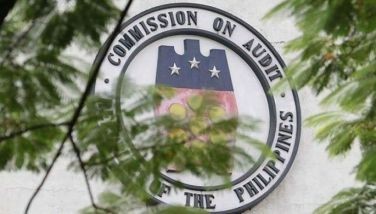CalPERS gives RP 30-day reprieve
February 19, 2004 | 12:00am
The California Public Employees’ Retirement System (CalPERS), the biggest pension fund in the United States, has agreed to delay its planned divestment of funds from the Philippines in order to review the recent reforms implemented by the government.
Emerging from a meeting of the CalPERS’ 13-member investment committee in Sacramento, Philippine Ambassador to Washington D Albert del Rosario said the Philippines will be given a one-month grace period after he made representations to the body about the recent reforms.
"That’s very tight, but we will try to do our best," Del Rosario said about the 30-day period.
Del Rosario, told the committee that the fund should take into account recent moves by Manila to cut stock transaction taxes, prevent the abuse of child labor and bolster the independence of the country’s judiciary.
If the Philippines is dropped off the list with finality, the country would have to wait until 2005 to be considered for reinstatement and only if CalPERS agreed to proposals to change its benchmarking of emerging markets.
In the evaluation of its external consultant, Wilshire & Associates, the Philippines was given a score of 1.87 points, up from 1.46 points last year. This upgrade, however, was still not enough for the two-point cut-off.
Foreign Affairs Secretary Delia Albert took exception to the report, saying it contained "some inaccuracies and which relied on third party sources."
"We regret that in the report submitted by Wilshire to CalPERS, which covers 27 countries, the consulting firm gave the Philippines a total score of 1.86, which was an improvement from 1.46 in 2003, but still below the score of two for qualified investment sites for the US pension fund," Albert said.
Del Rosario, in an interview over ANC yesterday said he urged for a review of the scoring system being used by CalPERS. He said that the review should be able to distinguish the degree of progress of the countries involved.
Along with India and Thailand, the Philippines was dropped from CalPERS‚ list of investment-grade emerging markets after all three countries failed the grading system used by Wilshire.
The grading system was intended to measure stock market efficiency, corporate governance practices, political stability and respect for human rights.
Unverified reports say that CalPERS holds about $67-million worth of Philippine stocks, but officials estimate that the actual volume is only $25 million.
CalPERS‚ emerging markets portfolio was estimated to have at least $2.6 billion in assets but the pension fund admitted that it missed out on about $83 million in profits from emerging markets because its standards forced it to drop surging countries like Thailand and India.
CalPERS is being persuaded by the Philippine government to lower its cut-off for permissible emerging market, a proposal originated by Wilshire itself.
At present, the investment report said CalPERS‚ permissible equity market list includes few Asian countries. Should this benchmark change occur, it would leave CalPERS with a large underweight in Asia and a large overweight in South America, Africa, and the Middle East.
"If the Philippines were not included in CalPERS’ permissible list in 2005, then there would be no investment in emerging Asia under the proposed index construction, unless the CalPERS 2005 permissible list includes more Asian countries than the 2004 list," the report said.
Argentina, Turkey and Peru also fell below Calpers’ report card threshold, but CalPERS said these countries would remain on the fund’s list of emerging markets during a one-year probationary period.
Malaysia, meanwhile, was added to the fund’s list of permissible emerging markets after receiving a higher score on the Calpers’ check list this year than it had a year earlier.
The Investor Relations Office (IRO) of the Bangko Sentral ng Pilipinas (BSP) is leading efforts to convince CalPERS within 30 days that it should be included in the list, citing recent efforts to cut stock transaction taxes, prevent the abuse of child labor and bolster the independence of the country’s judiciary. – With reports from Marvin Sy
Emerging from a meeting of the CalPERS’ 13-member investment committee in Sacramento, Philippine Ambassador to Washington D Albert del Rosario said the Philippines will be given a one-month grace period after he made representations to the body about the recent reforms.
"That’s very tight, but we will try to do our best," Del Rosario said about the 30-day period.
Del Rosario, told the committee that the fund should take into account recent moves by Manila to cut stock transaction taxes, prevent the abuse of child labor and bolster the independence of the country’s judiciary.
If the Philippines is dropped off the list with finality, the country would have to wait until 2005 to be considered for reinstatement and only if CalPERS agreed to proposals to change its benchmarking of emerging markets.
In the evaluation of its external consultant, Wilshire & Associates, the Philippines was given a score of 1.87 points, up from 1.46 points last year. This upgrade, however, was still not enough for the two-point cut-off.
Foreign Affairs Secretary Delia Albert took exception to the report, saying it contained "some inaccuracies and which relied on third party sources."
"We regret that in the report submitted by Wilshire to CalPERS, which covers 27 countries, the consulting firm gave the Philippines a total score of 1.86, which was an improvement from 1.46 in 2003, but still below the score of two for qualified investment sites for the US pension fund," Albert said.
Del Rosario, in an interview over ANC yesterday said he urged for a review of the scoring system being used by CalPERS. He said that the review should be able to distinguish the degree of progress of the countries involved.
Along with India and Thailand, the Philippines was dropped from CalPERS‚ list of investment-grade emerging markets after all three countries failed the grading system used by Wilshire.
The grading system was intended to measure stock market efficiency, corporate governance practices, political stability and respect for human rights.
Unverified reports say that CalPERS holds about $67-million worth of Philippine stocks, but officials estimate that the actual volume is only $25 million.
CalPERS‚ emerging markets portfolio was estimated to have at least $2.6 billion in assets but the pension fund admitted that it missed out on about $83 million in profits from emerging markets because its standards forced it to drop surging countries like Thailand and India.
CalPERS is being persuaded by the Philippine government to lower its cut-off for permissible emerging market, a proposal originated by Wilshire itself.
At present, the investment report said CalPERS‚ permissible equity market list includes few Asian countries. Should this benchmark change occur, it would leave CalPERS with a large underweight in Asia and a large overweight in South America, Africa, and the Middle East.
"If the Philippines were not included in CalPERS’ permissible list in 2005, then there would be no investment in emerging Asia under the proposed index construction, unless the CalPERS 2005 permissible list includes more Asian countries than the 2004 list," the report said.
Argentina, Turkey and Peru also fell below Calpers’ report card threshold, but CalPERS said these countries would remain on the fund’s list of emerging markets during a one-year probationary period.
Malaysia, meanwhile, was added to the fund’s list of permissible emerging markets after receiving a higher score on the Calpers’ check list this year than it had a year earlier.
The Investor Relations Office (IRO) of the Bangko Sentral ng Pilipinas (BSP) is leading efforts to convince CalPERS within 30 days that it should be included in the list, citing recent efforts to cut stock transaction taxes, prevent the abuse of child labor and bolster the independence of the country’s judiciary. – With reports from Marvin Sy
BrandSpace Articles
<
>
- Latest
- Trending
Trending
Latest
Trending
Latest
Recommended




























